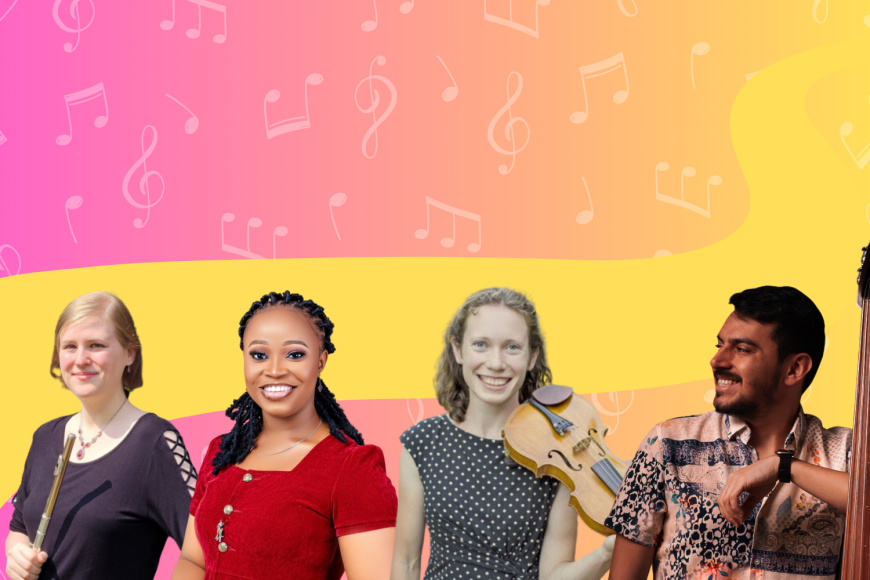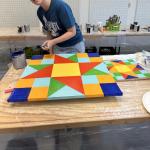What to Expect in Your First Online Lesson

Hundreds of new students connect to the great teachers on Lessonface each month. If you're considering taking the plunge into online lessons, you may be wondering what to expect in that first lesson. We asked teachers to share what they typically do in first lessons, and what students should know about getting started.
lesson. We asked teachers to share what they typically do in first lessons, and what students should know about getting started.
Teachers emphasize that the first lesson is typically to meet and greet, but most do try to get at least a bit of music into the session. Teachers will want to understand what your goals are, your current level, your tastes, and availability for practice so they can create a customized plan for you. Many will send a message before the lesson to establish as much of this information as is possible before the live session. The lesson flies by!
Here are a few teachers on how they structure their first lesson (either a full-length lesson, or a trial) in their own words:
"My first lessons always begin with an assessment of the student's goals, interests, and ability. I hear how they play and learn what they practice then we build a curriculum together in that first session," explains trumpet and cornet teacher Hannah Gaugush.
"It really depends on the student. I like to establish goals, assess level, and leave them with something to work on. I like to get them playing as soon as possible. Trials are generally shorter but essentially the same," writes guitar, banjo, and mandolin instructor Justin Heath.
Piano teacher Beverly Cashin explains that "The structure of the first lesson depends on how much I already know about the person, and on whether they have previous experience. Either way, I try to make it like a regular lesson: one exercise/scale practice, plus 2 songs to work on. Maybe rhythm or note-reading practice in the lesson to complement the songs. My free trials are sometimes just talking, and sometimes I show them materials we might use. In that case, I usually tell them that once they book a lesson, I'll send them those materials so they can go ahead and start practicing if they'd like to."
Voice and arranging teacher Jerrica Alyssa writes, "In trial lessons, I listen carefully to what their goals are, make them feel comfortable, ask them if they would like to share a bit of a sample of their singing. Then share what a plan for their course and our lessons will look like for them to be able to achieve their goals.
"I always leave the trial lesson with giving them a fun task that they can work on leading up to our first main lesson. For example creating a list of songs they would like to work on.
"I usually follow up with them a few days later to see if they’re interested and offer to invite them to their first lesson by suggesting a few times. Using the lessonface feature I invite them to the first lesson (if they have not already booked)."
"Music is joyful so I try to make that first lesson especially full of joy! We explore the instrument, play with rhythm, and see what the violin sounds like now (student) as well as what it can sound like after learning more (teacher)," shares violin teacher Mandi Vance.
How are online lessons different than in-person lessons?
Overall, online lessons are very similar to in-person lessons. Here are a few ways they differ:
- There may be some time going over the best audio settings to ensure you have the best audio settings in place for music-making. The best audio settings for music lessons are different than the Zoom default settings (which are targeted towards conversations). You can also knock this out ahead of time with this page.
- Demonstrating skills is of course less "hands on" than in an in-person lesson, which is not always a bad thing, honestly.
- You can expect to get more digital resources and great angles for viewing the teacher's approach to the instrument, and the easily accessible recording feature makes documenting so easy so you can come back later and see how you've improved, as well as to make clips of exercises and techniques your teacher demonstrates.
- Teachers vary on how they use recordings, and you can expect teachers to cover all of their basic policies and approaches, and make sure you're on the same page, in that first lesson.

We asked teachers how online lessons differ from in-person:
"When I teach in person, I do not offer a free 15 minute trial since I am traveling to their home (it needs to be a full lesson). Our first meeting is usually longer so we can have a short time to talk and also get started on some music. In first lessons online, I show them my studio and online tools. I try to record a video for them as well. That way it gives them something exciting to open and watch and to help them practice the first week," Veronica Gaudreau, piano teacher, explains.
"An online lesson has the option to use different media resources, that might not be available on a in-person lesson," mentions bassist Gustavo Martinez
"Not a lot. It's easier online because I have access to all my own materials, and don't have to deal with the common in-person situation where they forgot to bring their books!" writes Beverly Cashin.
Is there anything about the first lesson that students seem to misunderstand?
Teachers say: don't be intimidated, do be ready, and understand that you will need to practice to make progress.
On common misconceptions, teachers express that students should not feel intimidated, or like they're about to be judged. Great teachers are supportive and encouraging, not dismissive or arrogant.
Online live lessons are truly interactive. You are meeting a real, professional teacher, not a chatbot or animation, so come prepared with your instrument, and be ready to roll to make the most of your lessons!
And, you're going to need to practice outside of lessons to make progress.
Teachers in their own words:
"Online or in-person it's important to practice regularly outside of the class if you want to progress," Sonnie Sitz, voice and piano instructor cautions.
"That they should feel perfectly safe and comfortable and not be nervous about anything. We are here to encourage," writes multi-instrumentalist instructor Jason Fawks
"I'm not here to judge them, just offer constructive feedback and practice techniques," says Hannah Gaugush.
Has anything ever happened in a first lesson that has surprised you or made you change your approach for introductory lessons with students?
Teachers on Lessonface are experienced and capable at teaching online. They shared some of the progress they've already made in their teaching approaches and how they make sure students are headed for success under their tutelage.
"After spending the whole trial lesson talking about objectives etc the student said: I thought we'd actually start doing music in this lesson already. Since that day I always made sure that the trial lesson has a musical element as well," voice instructor Sonnie Sitz shares.
"Once a student who had really high expectations I would not be able to meet. I’ve learned to be upfront and express any concerns in a kind way if I sense them," Jason Fawks explains.
Lessonface students span ages and levels. We asked teachers how their approach in the first lesson differs based on the age and level of student.
"Mostly, while age does come into it, it’s what their level is that seems to be the key player. Of course young kids require a different skill set than older students, but the main point is where are we starting from? Do they have an idea of breath support and vocal technique or are we starting at zero. What they know about repertoire (for whoever genre they want to sing) is also key," indicates voice instructor Peter Furlong.
"For complete beginners we work on feeling their lips and getting a sound out, for more advanced players we sightread or play something they had already played previously which is usually preferable since they usually feel more comfortable. It is best that we just get to know each other and the new student gets clarification on any questions," writes flute and piccolo teacher Erika Andres.
"In working with age, level or goals, it totally differs as I focus on things like their concentration span. For example, when working with a child who is a beginner student, I encourage shorter lesson sessions, I make the lesson really playful, fun and enjoyable, bringing myself to their level and switching between serious time and playful time to help their concentration and attentiveness," expresses voice instructor Gloria Nwoke.
sessions, I make the lesson really playful, fun and enjoyable, bringing myself to their level and switching between serious time and playful time to help their concentration and attentiveness," expresses voice instructor Gloria Nwoke.
"For older adult students, I can speed up the teaching pace a little faster than if I were to teach young children in the first lesson. As for more advanced students, I will use a relatively musical language or terms in my first lesson. As for students learning the piano to sit for a music exam, my first lesson will cover the lesson short-term and long-term goals & planning; whereas for students who want to learn for leisure, the first lesson can be less rigid but will still cater to the specific goals of these students," explains piano and ABRSM prep instructor Donovan Kwan.
What sorts of materials do students get after the first lesson?
Online lessons make the exchange of materials, notes, and recordings, super easy! We've seen that teachers on Lessonface have created excellent support materials to share, many which they customize for each student. Here are a few responses from teachers about what they send to students after a first lesson.
"I usually make at least one recording. I often send a practice sheet of something (I created). I may also send screenshots of notes we made on the music. Students usually have their own music books, however sometimes I send something I arrange," wrote Veronica Gaudreau.
"I draw up custom tabs/notation for each student so I send them those and occasionally videos demonstrating the material," wrote guitar teacher Matt Francescini.
All teachers on Lessonface have their own approach to lessons. Discover more about on the teachers' profile pages, linked above in this article, or through the site navigation. A huge benefit to working with an excellent instructor is a bespoke learning experience based not only on your path, but theirs as well.
We've been offering online lessons at Lessonface since 2012, and have earned confidence in our guarantee of great teachers & great lessons. Great teachers inspire and motivate, encourage and support, starting from the very first lesson.




